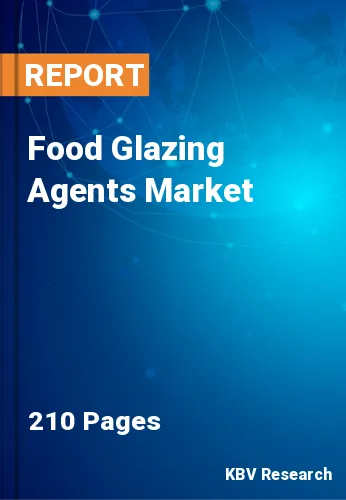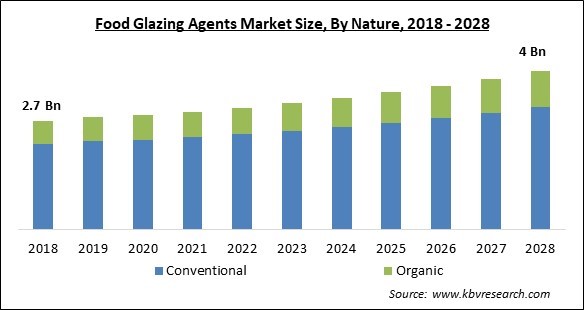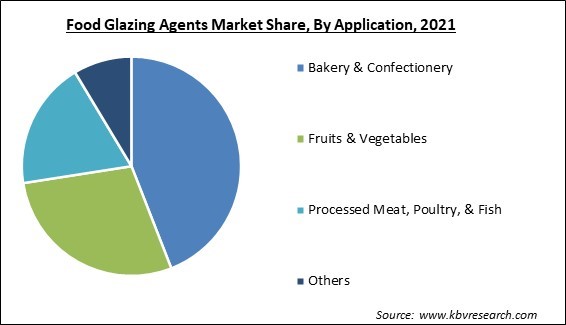
The Global Food Glazing Agents Market size is expected to reach $4 billion by 2028, rising at a market growth of 4.5% CAGR during the forecast period.
A specific kind of food additive known as a food glazing agent gives food products' outer layers a shiny appearance and a protective coating. Additionally, these substances improve the structure, act as a lubricant, which is a sealant to stop moisture loss, and retain oil. In the pharmaceutical and nutraceutical industries, they are frequently utilized in supplements, tablets, and capsules.

Food glazing agents are used more frequently in a variety of food applications, such as dairy products, fruits & vegetables, functional foods, and processed foods. Food manufacturers are expected to use glazing agents more frequently in the upcoming years because they can reduce the process of re-crystallization, enhance the visual appeal of the food product, and act as an anti-sticking agent.
Along with common food glazing agents like beeswax, shellac, carnauba wax, and others, the demand for their substitutes like dabber oils and sugar syrups is anticipated to increase significantly over the forecast years because of their accessibility and low cost. Food glazing agents are ingredients or substances used to protect & polish food items. They are also known as polishing agents or polishing additives.
The COVID-19 pandemic has had an effect on the market for food glazing agents from the sourcing of raw materials to the production of finished goods. Labour shortages and import & export limitations hindered the manufacturer around the world, the COVID-19 pandemic has had an effect on a number of industries. The production and distribution of food have seen a significant impact from the pandemic. A lot of food processing businesses have been forced to close as a result of strict lockdowns and social isolation tactics.
The market for food glazing agents is primarily driven by the expansion of the food additives industry and an increase in the consumption of processed foods. Also, the demand for vegan and organic foods will increase the need for food additives, which is accelerating the demand for food glazing agents. In addition, due to the busy lifestyles of people, they are increasingly demanding ready to eat food products, food additives are extensively used in these products with the motive of preserving the safety, freshness, taste, visual appeal, and texture of processed foods.
Food glazing agents are in greater demand as a result of their expanded use in the pharmaceutical and cosmetic industries. These agents have been found to be very effective at extending the shelf life of food products. The medicine is protected from changing environmental conditions by being encapsulated, and it also regulates how quickly the medicine enters the body. Due to their flawless glossy and smooth texture, naturally derived waxes made from plants or animals have proven to be useful in lipsticks, lip balms, and other skincare products.
There are two types of food additives natural and synthetic. Surface coating agents and food glazing agents are examples of these. The majority of food glazing agents are naturally occurring waxes derived from either plants or animals. Certain food glazing agents are manufactured synthetically, and the addition of these agents to food products is governed by various regulatory bodies. Some of these commercially available glazing agents have also received FDA approval.

Based on nature, the food glazing agents market is segmented into organic and conventional. In 2021, the conventional segment dominated the food glazing agents by generating the maximum revenue share. This is primarily due to the widespread distribution of traditional food glazing agents in the market. Chemical fertilizers are used in conventional food glazing agents to promote plant growth. Due to large production, these conventional food glazing agents are largely available and thus support market growth.
By application, the food glazing agents market is divided into bakery & confectionery, fruits & vegetables, processed meat, poultry & fish and others. The food & vegetable segment generated a significant revenue share in the food glazing agents market in 2021. Food glazing agents are anticipated to investigate market opportunities given that retailers use these products to give fruits & vegetables sold in their stores a shiny appearance. These agents also assist in preserving the product's freshness. In addition, the growing demand for various food and vegetable would escalate the growth of the segment.
On the basis of product type, the food glazing agents market is fragmented in stearic acid, beeswax, carnauba wax, candelilla wax, shellac and others. In 2021, the stearic acid segment held the highest revenue share in the food glazing agents market. Stearic acid is used to glaze food products, alter a product's melting point, act as a lubricant, stop oxidation, and shield the food from decay. Also, it is basically used as a component of dietary supplements.
| Report Attribute | Details |
|---|---|
| Market size value in 2021 | USD 3 Billion |
| Market size forecast in 2028 | USD 4 Billion |
| Base Year | 2021 |
| Historical Period | 2018 to 2020 |
| Forecast Period | 2022 to 2028 |
| Revenue Growth Rate | CAGR of 4.5% from 2022 to 2028 |
| Number of Pages | 210 |
| Number of Tables | 380 |
| Report coverage | Market Trends, Revenue Estimation and Forecast, Segmentation Analysis, Regional and Country Breakdown, Companies Strategic Developments, Company Profiling |
| Segments covered | Nature, Product Type, Application, Region |
| Country scope | US, Canada, Mexico, Germany, UK, France, Russia, Spain, Italy, China, Japan, India, South Korea, Singapore, Malaysia, Brazil, Argentina, UAE, Saudi Arabia, South Africa, Nigeria |
| Growth Drivers |
|
| Restraints |
|
Region wise, the food glazing agents market is analyzed across the North America, Europe, Asia Pacific & LAMEA. In 2021, the Europe region witnessed the largest revenue share in the food glazing agents market. The region's market for food glazing agents is anticipated to grow over the coming years as a result of the well-established food and beverage industry in Europe and the rising adoption of cutting-edge and organic food glazing agents by food manufacturers based in well-known European nations.
Free Valuable Insights: Global Food Glazing Agents Market size to reach USD 4 Billion by 2028
The market research report covers the analysis of key stake holders of the market. Key companies profiled in the report include Mantrose-Haeuser Co., Inc. (RPM International, Inc.), Capol GmbH (Freudenberg Group), Colorcon, Inc. (BPSI Holdings LLC.), Koster Keunen, Inc., The British Wax Refining Company Ltd., Masterol Foods Pty. Ltd., Poth Hille & Co Ltd., Stearinerie Dubois, Strahl & Pitsch, LLC. and Puratos NV/SA.
By Nature
By Application
By Product Type
By Geography
The Food Glazing Agents Market size is projected to reach USD 4 billion by 2028.
Rising demand for processed and ready-to-eat food are driving the market in coming years, however, A strict regulatory environment may impede the growth restraints the growth of the market.
Mantrose-Haeuser Co., Inc. (RPM International, Inc.), Capol GmbH (Freudenberg Group), Colorcon, Inc. (BPSI Holdings LLC.), Koster Keunen, Inc., The British Wax Refining Company Ltd., Masterol Foods Pty. Ltd., Poth Hille & Co Ltd., Stearinerie Dubois, Strahl & Pitsch, LLC. and Puratos NV/SA.
The expected CAGR of the Food Glazing Agents Market is 4.5% from 2022 to 2028.
The Bakery & Confectionery market is leading the Global Food Glazing Agents Market by Application in 2021; thereby, achieving a market value of $1.6 billion by 2028.
The Europe market is showcasing high market share in the Global Food Glazing Agents Market by Region in 2021; thereby, achieving a market value of $1.3 billion by 2028.
Our team of dedicated experts can provide you with attractive expansion opportunities for your business.
